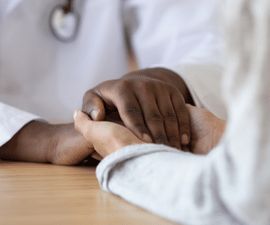
Treatment Planning
Managing Treatment Side Effects

Treatments for lymphoma, including chemotherapy, monoclonal antibodies, immunotherapy, radiation, and steroids often have side effects, although many treatments are well tolerated. Each patient is different so the side effects that occur and how severe they are may be different as well.
Before agreeing to treatment by a specific specialist and treatment center, make sure that they will be able to meet all medical and personal needs. Patients should feel comfortable with the healthcare team and the quality of the care they provide.
Diet
Diet is a key part of managing both lymphoma and side effects of lymphoma treatment, as it provides the body with the nutrients and energy necessary for health. Many side effects can affect how patients feel about food and eating. Eating smaller meals more often rather than a few large meals each day may help patients feel less nauseous and make it easier to eat when appetite is diminished.
Food to try:
- Foods rich in carbohydrates to help decrease nausea
- Fresh fruits, vegetables, protein and diary to help increase and maintain strength and energy
- Liquid nutritional drinks to receive necessary vitamins and calories and address mouth sores
- Drinking lots of liquids to prevent dehydration, nausea, vomiting and diarrhea
Foods to avoid:
- Fatty foods to avoid nausea
- Crunch, salty, spicy or acidic foods that may cause discomfort if a patient has mouth sores
- Soft cheeses or cheeses with mold, raw or undercooked meat, eggs or tofu to reduce the risk of infection
Routine and Fatigue
Lymphoma and its treatment can cause fatigue. Changing routines may help accomplish daily tasks more easily. Prioritize the most important activities and let people who want to help do so. Planning chores or breaking down big tasks into smaller ones can help decrease tiredness.
Intimate Relationships
Intimate relationships may be affected during and following diagnosis and treatment for lymphoma. Intimacy is a very complicated issue that can be impacted by psychological factors (such as body image, desire, and emotional strain) as well as physical changes (such as fatigue, pain, dryness). Patients may experience changes in all, some, or none of the phases of sexual response (desire arousal, orgasm, resolution). Open communication, time and patience are important while finding the most helpful remedy. Patients should discuss with their healthcare team what sexual changes patients tend to experience during and after treatment and what can be done to prepare for and manage these changes.
Immune System and Safety
If white blood cell counts are low as a result of treatment, avoiding people who are coughing or sneezing can help reduce the risk of infection. Washing hands or using a hand sanitizer after visiting public places or touching items used by others is important. Patients should let their doctor know if they develop a fever during treatment, as this may be a sign of an infection.
Memory and Concentration
Cancer and cancer therapy may also affect thinking, memory, concentration, and attention. This is sometimes referred to as “chemo brain.” Modest lifestyle modifications may be helpful, including making reminder lists, following structured routines, and, if necessary, delaying important decisions or tasks that require intense concentration. Exercising the mind with puzzles and brain teasers helps as well.
Helpful Resources: